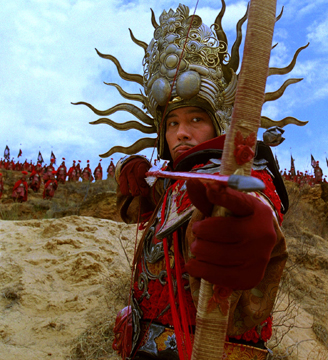 In full regalia, Hiroyuki Sanada prepares to let fly in ‘The Promise.’
In full regalia, Hiroyuki Sanada prepares to let fly in ‘The Promise.’
|
| The Promise\r\nStarring Jang Dong-kun, Hiroyuki Sanada, and Cecilia Cheung. Directed by Chen Kaige. Written by Chen Kaige and Zhang Tan. Rated PG-13. |
|
A D V E R T I S E M E N T
|
|
|
|
A D V E R T I S E M E N T
|
|
Taking It On the Chen
A terrific filmmaker muddles the Chinese martial-arts picture The Promise.
By KRISTIAN LIN
The Promise is not to be confused with The Proposition, a Western that opens in Dallas this week, nor is it to be confused with Chekhov’s playlet The Proposal or the Broadway musical Promises, Promises. No, The Promise is the most expensive movie ever shot in China, a martial-arts fantasy epic in the same mold as those by Ang Lee, Zhang Yimou, and Quentin Tarantino, among others. The director here is Chen Kaige, and you’d hope such a distinguished filmmaker would match the sterling contributions of his predecessors. Instead, he falls on his ass.
Set in the distant past, the movie begins with a brave but untrustworthy general named Guangming (Japanese actor Hiroyuki Sanada) being called from his latest battlefield triumph to save his king (Qian Cheng) from a treacherous lord named Wuhuan (Nicholas Tse). En route, the general is separated from his troops and seriously wounded by an assassin. Thus, he orders his slave Kunlun (Korean actor Jang Dong-kun) to dress up in his armor and carry out his mission. When Kunlun reaches the palace, however, he finds the besieged monarch busy trying to put a sword through his wife (Cecilia Cheung), so the slave makes an executive decision and kills the guy he’s supposed to rescue. Guangming is blamed for the assassination and loses everything except the king’s grateful wife, a princess named Qingcheng who doesn’t know her rescuer’s true identity and has been cursed by the gods to enjoy infinite riches but never find true love. As Kunlun pines away for the princess, Wuhuan’s scheming threatens everyone’s happiness.
As expected, Chen brings his eye-popping visual style to the material. Cinematographer Peter Pau (Crouching Tiger, Hidden Dragon) saturates the colors to within an inch of their life yet somehow retains absolute clarity — near the beginning we see a tree in a field, and you can follow the flight of every single lavender flower as it blows off in the wind. The costumes by Tim Yip and Kimiya Masago are exercises in glorious excess. Guangming’s army is kitted out in scarlet uniforms that make Kabuki outfits look like rags, and when the soldiers twirl their gleaming scarlet shields in unison, the effect is like a Busby Berkeley musical number. The movie’s stuffed with similarly sumptuous visuals, from the spectacular desert vistas in the opening battle to the goddess (Chen Hong) who appears floating in midair, with her hair and robes undulating softly like she’s underwater.
The trouble is that when you’re not ooh-ing and aah-ing, you’ll often be laughing. With its flying warriors and mythic dimensions, the wuxia film has always courted parody (the “turn off your cell phone” fake trailer currently running at AMC Theatres, for example), but this movie tips all the way over. The curse that hangs over Qingcheng is impossible to take seriously, as is the idea that all people from Kunlun’s enslaved homeland (identified as “The Land of Snow”) possess supernatural powers. The opening slapstick comedy sequence in a battlefield full of dead soldiers strikes entirely the wrong tone. The film is also informed by the bizarre notion that slaves don’t know how to walk, only crawl. This leads to an early scene when Kunlun outruns a cattle stampede by galloping on all fours, which is worthy of one of Stephen Chow’s loony comedies. This movie has appealing eye candy, but without gravitas, it’s no better than last year’s Aeon Flux.
Badly served, the actors don’t even have much chance to shine in the fight sequences, which are acceptable but can’t match the ones in Kill Bill or Kung Fu Hustle. Sanada and Jang (seen to better effect as a berserk soldier in the Korean War film Tae Guk Gi) give decent performances that are dwarfed by the special effects. Better off are the actors who overplay, such as Tse as an effeminate bad guy and especially Cheung as the princess. This unremarkable-looking, astonishingly versatile actress is known primarily in Hong Kong for her light comedies, but her career has also included action thrillers and a terrific dramatic performance as a bus driver’s widow in a film called Lost in Time. She’s equally convincing here as a larger-than-life personage who’s been touched by the gods. The movie should have given us more of her, though perhaps the version of the film released in Asia (about 20 minutes longer than the one we’re seeing) did that.
All in all, The Promise seems to indicate a director in search of a subject. Chen has experimented with different genres recently, but they’ve all misfired in some way: the musical tearjerker Together, the English-language Hitchcock pastiche Killing Me Softly, the gritty historical epic The Emperor and the Assassin. Perhaps it was just the alignment of the planets that gave rise to the unique power of Farewell My Concubine, the 1993 movie that first made him and arguably his entire country’s cinema famous. For a director with such splendid gifts and a bravura style, his next work will always be a potential masterpiece. For now, though, Chen Kaige is in the same boat with Tim Burton, talented enough to make only interesting failures.
 Email this Article...
Email this Article...

